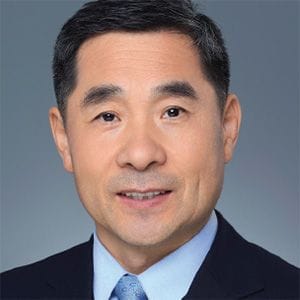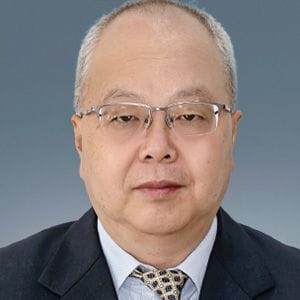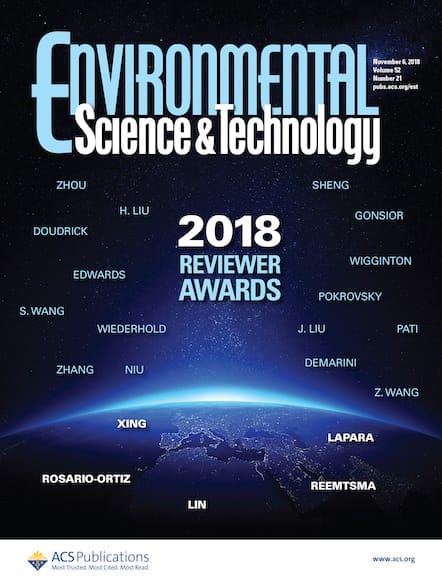This annual award recognizes change makers whose research and service contributions have substantially supported improvements in human health and/or the environment. Read our exclusive interviews with this year's winners below.

Environmental Science & Technology, Environmental Science & Technology Letters, and the ACS Division of Environmental Chemistry (ENVR) are delighted to announce the joint winners of the 2024 Outstanding Achievements in Environmental Science & Technology Award.
This award recognizes contributions to the fields of research that have substantially contributed to improvements in human health and/or the environment. These improvements include, but are not limited to, new public policies, devices, or treatment systems widely adopted by governments, industry, or researchers.
2024 marks the award's fourth year, and this year we are excited to recognize two outstanding researchers based in the Asia Pacific Region.
Congratulations to Professor Jun Ma from Harbin Institute of Technology, People’s Republic of China, and Professor Han-Qing Yu from the University of Science & Technology of China, People’s Republic of China, on this significant achievement.
Read our exclusive interviews with the 2024 award winners below.
Professor Jun Ma

Describe your current area of research (or areas of interest).
In my current area of research, I am focused on advancing sustainable urban water systems with a strong emphasis on green and low-carbon technologies. The overarching goal is to develop innovative solutions that not only combat water pollution but also contribute to environmental sustainability. Within the realm of sustainable urban water systems, my work extends to source recovery of waste. This entails developing strategies to reclaim valuable resources from wastewater and other sources, aligning with the principles of circular economy and resource efficiency.
The integration of green and low-carbon technologies is a cornerstone of my research approach. I strive to pioneer cost-effective and high-efficiency water treatment technologies that not only safeguard public health but also minimize the environmental impact. Through the exploration of oxidation, adsorption, and catalytic properties of in-situ formed Mn and Fe species (IN-Mn/Fe), I aim to develop low-cost and easy-to-operate technologies centered on micro-nano interfaces, applicable across the entire water loop from drinking water purification to advanced wastewater treatment and reuse.
Ultimately, my research is driven by a commitment to addressing water crises globally, ensuring public health, and contributing to a sustainable and resilient future through the development and implementation of cutting-edge technologies in the field of water science and technology.
What have been some of the key influences that have shaped how your career has developed?
Fundamental research and practical engineering practice have been the dual pillars shaping the trajectory of my career in water science and technology. The synergy between these two realms has significantly influenced my approach and contributed to the success of my endeavors.
Fundamental research has been a cornerstone of my career development. Through extensive exploration of the oxidation, adsorption, and catalytic properties of in-situ formed Mn and Fe species (IN-Mn/Fe), I have been able to uncover critical features that enable diverse applications in water treatment. This foundational knowledge has provided the basis for developing innovative and effective technologies that address complex water challenges, from algae removal to heavy metal and organic pollutant removal.
Simultaneously, my involvement in practical engineering practice has played a pivotal role in shaping the real-world impact of my research. This hands-on experience has not only validated the efficacy of my research findings but has also allowed for the development of cost-effective and easy-to-operate solutions that can be globally applied in water systems.
The integration of fundamental research and practical engineering practice has proven instrumental in my ability to address water crises and ensure public health. Whether directing major emergency responses to river pollution incidents or pioneering catalytic ozonation technology, the combination of theoretical understanding and practical application has been crucial in developing comprehensive and sustainable solutions.
Overall, my career has been shaped by a commitment to balancing cutting-edge research with hands-on engagement in practical engineering, ensuring that the innovations emerging from my work are not only scientifically sound but also practically viable and impactful in addressing the complex challenges within the field of water science and technology.
What do you consider some of the most important highlights from your career so far?
Several highlights from my career underscore the significance of building sustainable water treatment systems and developing green, low-cost, and economic water treatment technologies. These achievements represent key milestones in my commitment to addressing water challenges and promoting environmental sustainability:
One of the most important highlights in my career is the development and implementation of sustainable urban water treatment systems. By integrating green and low-carbon technologies, I have addressed several water crises and ensured public health for millions. For instance, I directed the major emergency response to the Songhua River pollution on the China-Russia border, and also resolved a 2010 thallium pollution crisis and a 2006 blue-green algae outbreak in China.
Specifically, I have focused on the exploration of green and low-cost water purification technologies leveraging Mn and Fe intermediates, in-situ formed oxidizing species, and their nanoscale effects. Technologies including potassium permanganate/ferrate-based oxidation, catalytic ozonation, persulfate activation, and their combined applications are developed by my team. These low-cost and easy-to-operate technologies have been widely applied in the removal of organic compounds and heavy metals, odor and algae control, enhanced coagulation, disinfection by-product control, advanced wastewater treatment and alternative water resource utilization. The impact of my work extends beyond theoretical research, with the practical application of developed technologies globally. These innovations cover the entire water loop, from drinking water purification to advanced wastewater treatment and reuse.
What is your advice for young investigators?
For young investigators entering the field, my advice is rooted in a holistic approach that encompasses both fundamental study and active engagement in engineering practice. Here are some key insights.
Focus on Fundamental Study: Emphasize a strong foundation in fundamental research. Invest time in understanding the underlying principles of your field, as this knowledge will serve as the bedrock for meaningful and innovative contributions. Strive for depth in your area of expertise. Specialization in a specific domain allows for a more nuanced understanding and the potential for groundbreaking discoveries.
Engage in Engineering Practice: Actively participate in engineering practice to bridge the gap between theory and application. Practical experience enhances your ability to translate research findings into real-world solutions with tangible impact. Collaborate with industry professionals and practitioners to gain insights into the practical challenges and opportunities within your field.
No Fear of Failure: Embrace a mindset that welcomes challenges and failures as valuable learning experiences. Innovation often arises from setbacks, and resilience is a key trait for success in any research or engineering endeavor. Be willing to take calculated risks in your research pursuits. Bold ideas and experimentation can lead to breakthroughs that contribute significantly to your field.
Consider Academic Influence: Actively seek opportunities for collaboration and knowledge exchange within the academic community. Attend conferences, participate in workshops, and engage with peers and mentors to broaden your perspective and stay abreast of the latest developments.
Teaching as a Form of Impact: Recognize the impact of teaching and mentorship. Sharing your knowledge with others not only contributes to the growth of your field but also allows you to refine your own understanding through the process of explaining complex concepts to others.
Engineering Influence: Understand the practical implications of your research on engineering solutions. Strive to align your work with real-world challenges and contribute to the development of technologies that address pressing issues in your field.
Social Influence and Responsibility: Acknowledge the broader societal implications of your work. Consider the ethical and social dimensions of your research and how it can positively contribute to the well-being of communities and the environment. Engage with the public, policymakers, and stakeholders to communicate the importance of your research and its potential societal benefits.
Overall, a successful career for a young investigator involves a delicate balance between rigorous fundamental study, active participation in engineering practice, and the ability to navigate the academic, teaching, engineering, and social influences that shape the broader context of research and innovation. By maintaining curiosity, resilience, and a commitment to positive impact, young investigators can forge a path of meaningful contributions in their chosen field.
Professor Han-Qing Yu

Describe your current area of research (or areas of interest).
My research group has been dedicated to the development of heterogeneous catalytic technologies towards sustainable water management. My current research interests are mainly in heterogeneous catalytic degradation of recalcitrant organic pollutants by using chemical oxidation, electrocatalytic or photocatalytic technologies. Heterogeneous catalysis is a fascinating process that is broadly involved in diverse fields such as chemical engineering, material synthesis, biomedicine and environmental remediation. Despite the significant importance and great promise of the heterogeneous catalytic decontamination technologies for low-carbon water treatment and cycling, their practical application at the current stage still faces many economic and technical constrains including intensive energy/chemical consumption and secondary pollution.Therefore, we hope to further innovate the decontamination theory, material design and treatment processes, aiming to revolutionize the catalytic decontamination paradigm and put it into practical application.
What have been some of the key influences that have shaped how your career has developed?
I was born and grown in a small town near Chaohu Lake, the fifth largest freshwater lake in China. Since my childhood, I have witnessed severe pollution and frequent outbreaks of algal blooms in the lake, and recognized the huge damage and health risks caused by pollution. During my study, I gradually realized that enhancing management alone cannot solve the problem, we also need effective and affordable technologies for reducing pollutants at the source. Therefore, I decided to pursue environment research and make my contribution to environmental water protection.
What do you consider some of the most important highlights from your career so far?
The important highlight and achievement in my career is that I cultivated many outstanding young talents. During the past two decades, as a postgraduate supervisor, I have been taking great time and efforts in guiding the students in their study, research and career development. To date, I have cultivated over 100 environmental professionals who have become leaders or pivotal researchers in their individual fields, and many have become professors like me. We are glad to make out contribution in jointly promoting the new advances in environmental technology and sustainable water management.
What is your advice for young investigators?
There was once a famous football team, AFC Wimbledon, in England. In each game, the player who got the ball at the backcourt always gave a long kick to the frontcourt, and in many times this worked well. Doing research is somewhat like playing football. There are many uncertainties ahead, but creating opportunities and taking fast action are always very important for reaching the final success. So, when you are facing something new or uncertain in your research and you are hesitating about your choices, my advice is, don’t worry, just kick it off, and see what will happen!
